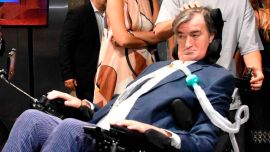With a reform of the health system in the air, CGT trade unionists on Tuesday warned about the future of their obras sociales healthcare schemes, even hinting at a possible strike at the end of the month.
The CGT, Argentina’s main trade union confederation, held an emergency meeting at the headquarters of the UPCN civil servants union in the light of the “integral reform … for a more efficient use of resources” proposals advanced by Vice-President Cristina Fernández de Kirchner just before Christmas, merging the public and private sectors with the obras sociales in a single system. The prospect deeply worries the CGT since these healthcare schemes account for much of trade union funding.
Furthermore, union leaders warned about the economic difficulties of sustaining the current system deeply in the red and strained by the pandemic, which had nevertheless demonstrated, they insisted, "the solidity and level of coverage of one of the health systems with the most solidarity in the world, as well as the need to endow it with sufficient funds to guarantee health as a whole."
"The pandemic has multiplied exponentially the costs of attention in our own medical centres and the expense of contracting private clinics and sanatoria elsewhere," read a statement from the CGT issued after the meeting.
"The income of the obras sociales has fallen off year after year in line with the deterioration of wage purchasing-power," it concluded, declaring that the entire infrastructure of the obras (including hotels, sports clubs and training institutes as well as medical centres) had been reconverted to meet pandemic needs.
Trade unionists at the meeting hosted by Andrés Rodríguez (UPCN) included CGT head Héctor Daer (health workers), Carlos Acuña (service stations), Armando Cavalieri (shop employees) Omar Maturano (La Fraternidad train-drivers) Antonio Caló (UOM metal workers) José Luis Lingeri (Obras Sanitarias waterworks) Gastón Frutos (bakers) and Rubén Pronotti, (representing UOCRA construction workers union secretary-general Gerardo Martínez).
While not going quite as far as his vice-president, Alberto Fernández has hinted at an upheaval. "There is a structural problem in the health system which must be reviewed," the president said recently, although in the first week of the year he assured Swiss Medical owner Claudio Belocopitt that he would not be nationalising the private health system.
As last year drew to a close, President Fernández told a radio station: "I’m trying to see how prepaid medicine can have some type of state control because they net public savings and nobody controls anything, the only thing they do is ask for increases."
‘Permanent negotiation’
Rodríguez called for "permanent negotiation" with the government to permit the funding of the union-run healthcare schemes, expressing the hope that in this year’s collective bargaining public-sector workers can recover the purchasing-power which they have been losing since 2018.
He was very critical of the opposition, describing them as "without leadership and without proposals.”
Daer also spoke out on behalf of schemes, claiming they covered “over half the population.” He continued: “It’s up to the state where to find the funding. We have to see the way to financing a system which is exemplary in the world and which gave excellent results during the pandemic, especially if we compare them with the region. We talk about it constantly with the government."
Nevertheless, Tuesday’s meeting failed to produce any concrete proposals for financing the union-run system, in crisis due to their operating deficit aggravated by the pandemic.
Confronted with the vice-presidential argument that an integrated system would improve efficiency, Daer responded that it should first be seen whether there was room for improving efficiency within the public and private sectors.
The health workers union leader pointed out that the pandemic had increased healthcare costs by 15-20 percent in some cases, quite apart from the risks faced by his union members.
Caló’s way of confronting Vice-President Cristina Kirchner’s presumed plans for an integrated health system was to remind her that it is President Fernández who governs and that her job was running the Senate.
"There’s no confrontation – I support this president and this government. The vice-president is one thing but I agree with the president, their opinions are different," the UOM leader said as he arrived at Tuesday’s meeting.
Asked if he was worried about the strong chances of ultra-Kirchnerite leader Liliana Korenfeld returning to the SSS (Superintendencia de Servicios de Salud monitoring health services), Caló replied: “The lady of whom you speak has already been in the SSS and we have worked together. It doesn’t worry me who’s in the SSS but that it runs properly.”
– TIMES with agencies

























Comments